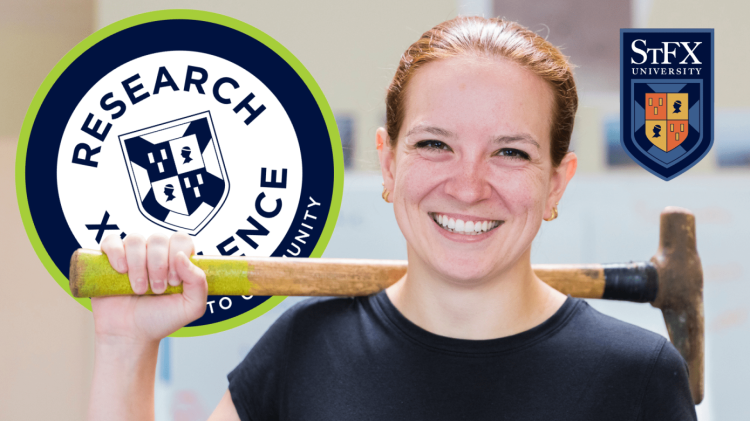Research X'cellence: Our StFX community levering expertise on today's most pressing challenges. At StFX, innovative research and creative activity are benefiting our communities, addressing some of today's most pressing challenges. Research X'cellence shines a spotlight on members of our inspiring educational community and the impact they're making. (To see the full series, please click HERE.)

Dr. Celeste Cunningham
Critical minerals: Dr. Celeste Cunningham bolstering economy by looking for answers in the rocks
Ever since she was a child who stuffed rocks in her pockets, Dr. Celeste Cunningham has been fascinated with geology. Today, the StFX earth and environmental sciences professor is using her expertise to play a key role in helping Nova Scotia and Canada work towards the transition to clean energy.
Dr. Cunningham, a sedimentary geologist, is leading research aimed at understanding how Nova Scotia can find additional critical minerals, important for renewable energy, food production, healthcare and more. She is also focused on doing so in an environmentally sustainable way: her work concentrates on old coal mines and ancient, exposed seabeds.
"Critical minerals are a group of minerals, mostly metals, which are important to everyday technologies and green technologies we're trying to develop. We need them and they can be difficult to get. They're limited in their global distribution," Dr. Cunningham explains on her work to develop a regional supply of critical minerals that would help bolster the provincial economy while helping protect from the disruption of global supply chains.
"My work is to identify sources in Nova Scotia and to determine how they form, how we can access them, and how we can develop a local supply chain. The list is long nickel, cobalt, zinc, copper, manganese, it's mostly metals."
"I'm hoping to help strengthen Canada's and Nova Scotia's positions. One of the objectives is to see Canada became a leader in green technology and energy transition. My goal is to help with that."
~ Dr. Celeste Cunningham, StFX earth and environmental sciences professor
The minerals are used in phones, computers, windmills, medical equipment, and a lot of advanced and green technology. Both the Canadian and Nova Scotia governments have identified critical minerals as a priority area.
Of the 31 elements that Canada has deemed to be critical, many are concentrated by sedimentary rock-forming processes.
"I'm hoping to help strengthen Canada's and Nova Scotia's positions. One of the objectives is to see Canada became a leader in green technology and energy transition. My goal is to help with that."
FORMER COAL MINES, EXPOSED SEABEDS
In her work, Dr. Cunningham is looking to address how extensive the deposits are and how we can access them. She has two main areas of study.
Her most recent research includes a preliminary study looking at coal-bearing rocks around the provinces with an intent to study pre-existing mine waste in former coal mines in Nova Scotia to determine the concentration of minerals. "We want to be environmentally friendly and sustainable. There may be enriched minerals in these areas. Could we repurpose that waste in a more environmentally friendly way?" she wonders.
The second area taps into a burgeoning interest in seabed mining, which can be difficult, expensive, and potentially environmentally disruptive. "Fortunately, in Nova Scotia, we have ancient seabeds that have been exposed on land. I'm looking at these ancient seabeds to see if we can access them and also to see whether these ancient seabeds have the same critical mineral deposits that modern seabeds do in the first place."
Dr. Cunningham has conducted research in this area since 2023 and has already found critical minerals in these seabeds. She is now expanding the project.
She's been funded three times by the provincial government through the Department of Natural Resources and Renewables. Additionally, she holds a Canada Foundation for Innovation (CFI) grant with matching funds from Research Nova Scotia.
Dr. Cunningham's main research field sites are in the Sydney, Cape Breton area; in New Glasgow; in Liscomb on the eastern shore; and in Bridgewater. The research work is highly field-based, with lab analysis done throughout the school year.
So far, she's been able to involve six undergraduate students in the research.
DEEPLY INTERESTED IN ROCK FORMATION
Geology has been a lifelong fascination. Her family even bought her a textbook as a gift at age 12. As an undergraduate post-secondary student, she focused her studies in the area and she has never looked back.
"I'm interested in the processes that form rocks. I'm deeply interested in that formation process. This research ties in well with that," she says.
"I'm very interested in why these rocks occur, what conditions you need to create them, and to understand the processes, why does they happen."
Dr. Cunningham's specialty is oceanic rocks. She is keen to understand the processes that shape and alter the seafloor.
"The bottom of the sea is quite inaccessible. We have a lot of questions geologically on what is happening at the bottom of the ocean."
CLUES IN THE ROCKS
"I love being outside, in nature, seeing all these incredible locations, and being around the cliffs and beaches and completely involved in and immersed in the geology. And you have a problem to solve. I always feel like a detective, with these clues. The clues are in the rocks. It's our job to go and read them. I love that aspect."
She's also motivated by a desire to protect the environment.
"We need critical minerals for these environmentally friendly technologies, but we don't want to damage the environment in the process. That's why my focus is on looking at old seabeds and mine waste. It's an environmentally friendly way to get these minerals."
The fact the projects are helping people and are applicable to real life is something that drives her in her work.
Dr. Cunningham, a native of Kingston, ON, joined the StFX faculty in 2022 just as she completed her PhD at the University of Ottawa. At StFX, she teaches an introductory course to natural hazards, sedimentology (her specialty), geomorphology (all about landscapes) and an introductory course required for all students in the earth and environmental sciences program.
"I really like geology," she says. "It helps us understand the planet we live in today. The processes and places. I find it all so cool, and all of that comes back to geology."













